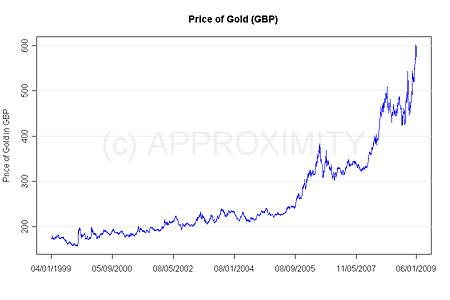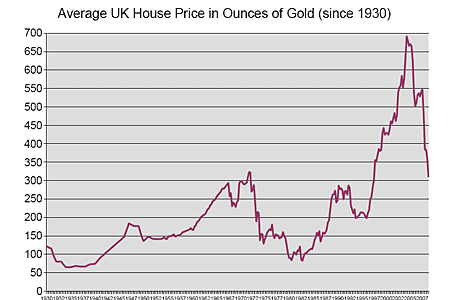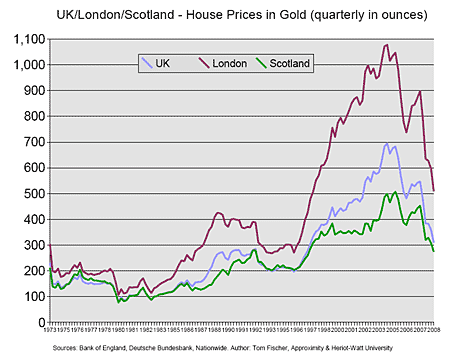Get the latest financial news, insights and expert analysis from our award-winning MoneyWeek team, to help you understand what really matters when it comes to your finances.
You are now subscribed
Your newsletter sign-up was successful
Want to add more newsletters?

Twice daily
MoneyWeek
Get the latest financial news, insights and expert analysis from our award-winning MoneyWeek team, to help you understand what really matters when it comes to your finances.

Four times a week
Look After My Bills
Sign up to our free money-saving newsletter, filled with the latest news and expert advice to help you find the best tips and deals for managing your bills. Start saving today!
What was the best-performing asset of 2008? The Japanese yen. The many funds that had borrowed money in yen to buy assets in other currencies, now sold those assets and bought back yen to pay down debt. This was the unwinding of the Great Yen Carry Trade.
Hard to believe though it is with all the huge volatility, the next best performer was gold, up about 6% on the year against the dollar, and a lot more against everything else from stocks to real estate.
Gold was down some 15% against the yen. But those who bought their gold with British pounds will be delighted. After a hedge-funding beating 30% gain in 2007, we saw a stupendous 44% rise in 2008. Gold broke out above £600 to all-time highs.
MoneyWeek
Subscribe to MoneyWeek today and get your first six magazine issues absolutely FREE

Sign up to Money Morning
Don't miss the latest investment and personal finances news, market analysis, plus money-saving tips with our free twice-daily newsletter
Don't miss the latest investment and personal finances news, market analysis, plus money-saving tips with our free twice-daily newsletter
However, it was an extremely volatile year and many of those attempting to trade gold with margin - in other words, with borrowed money - will have been wiped out. It's why I am forever saying that you should buy the physical metal itself.
The outlook for sterling is grim - gold is your insurance
Even silver, which had a pretty woeful year by all accounts and was down some 24% against the US dollar, made 13% against the pound. (That most frustrating of metals continues to frustrate). As we all know, the outlook for sterling is grim. I do not rule out a full-scale currency collapse. But, for now, it appears to be making some kind of a bottom against the US dollar.
If you look at how gold has traded vs sterling since Gordon Brown sold our gold, you will notice a distinct staircase pattern. It shoots up, then consolidates at the higher level, then shoots up.

Based on this repeating pattern, since we have just had a sharp shot up and this could continue for a short while longer - a period of consolidation is now likely, before the inevitable march to £1,000 an ounce and beyond. But I would not sell a flake of your physical gold yet. It is your insurance - if sterling implodes, you'll need it.
Enjoying this article? Sign up for our free daily email, Money Morning, to receive intelligent investment advice every weekday. Sign up to Money Morning.
When measured in gold, this is already the worst house price crash in history
I don't know if this sell-off in sterling has been orchestrated, but it suits the government. The economic downfall doesn't look nearly so bad measured in weakened sterling as it does in, say, dollars. House prices are down some 15-20% from the highs, depending whose figures you use, measured in sterling. But measured in gold, this is already the worst crash in history, as the chart below shows.

What's more, this crash still has a lot further to go.
In this chart, having risen by the most, London prices look set to fall by the most:

(My thanks to mathematician Tom Fischer of Heriot-Watt University for these superb charts, which he kindly offers free of charge. You can see more of his work here.)
There are many people out there, myself included, who sold property and bought gold. They were considered cranks and crackpots by their nearest and dearest. Those nearest and dearest are now revising their opinions. The long-term trade of property to gold and back to property when certain targets are reached (100 ounces of gold for the average UK home, maybe?) is still very much alive and well.
Gold is on track to be a top performer this year
In late November I wrote that I felt gold stocks were set to be the best performing asset class over the next two years. We are already on track with the HUI (the index of major gold producers) up about 50% since then. Now that tax-selling is done in North America it ended at Christmas some significant buying has come into gold stocks of all kinds, from explorers to majors, and we are seeing some impressive action everywhere. Hold your positions.
Over Christmas, I had a long conversation with my step-father about gold. He's South African, so perhaps has a greater familiarity with gold than many of us Brits. In the 1970s, you weren't allowed to take your money out of South Africa. (Who knows what currency controls are headed our way as governments Brown's in particular move to tighten international banking regulation).
The rand was falling fast and nationals saw their purchasing power collapse. Many of those who fled, he told me, got their wealth out of the country by carrying out Krugerrands. His parents were Jewish and fled Poland in the 1930s. They too transported their wealth through a similar means. And yet he doesn't like gold, because, he says, it doesn't pay any interest. I reminded him how much interest you get on dollars and on yen. From tomorrow, as the Bank of England cuts interest rates further, it looks like you'll get a similar amount on pounds. Paper currency paying as much interest as gold, who'd've thought it?
The gold bull market of the 1970s ended when the then chairman of the US Federal Reserve, Paul Volcker, raised interest rates to 20%. Interest rates of 20% are a long, long way off this time around and so is the end of gold's great bull market.
Our recommended article for today
How to tell when a sector is about to crash
Following crowds is a poor way of making investment decisions - crowds make bubbles and bubbles always pop. So how do you know when a sector has been taken over by financial fashion victims? There is one simple but surprisingly reliable way.
Get the latest financial news, insights and expert analysis from our award-winning MoneyWeek team, to help you understand what really matters when it comes to your finances.
MoneyWeek is written by a team of experienced and award-winning journalists, plus expert columnists. As well as daily digital news and features, MoneyWeek also publishes a weekly magazine, covering investing and personal finance. From share tips, pensions, gold to practical investment tips - we provide a round-up to help you make money and keep it.
-
 Pension Credit: should the mixed-age couples rule be scrapped?
Pension Credit: should the mixed-age couples rule be scrapped?The mixed-age couples rule was introduced in May 2019 to reserve pension credit for older households but a charity warns it is unfair
-
 Average income tax by area: The parts of the UK paying the most tax mapped
Average income tax by area: The parts of the UK paying the most tax mappedThe UK’s total income tax bill was £240.7 billion 2022/23, but the tax burden is not spread equally around the country. We look at the towns and boroughs that have the highest average income tax bill.

